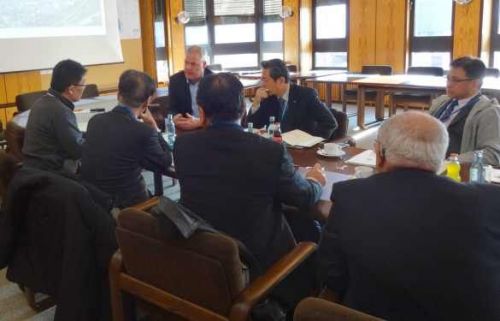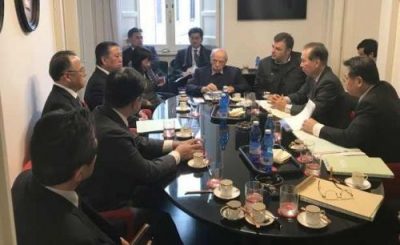Okinawa Prefectural Assembly member travel to Germany and Italy, find major and “unsettling” differences in the nature of U.S. forces stationed in each country

Committee members meeting with Mayor Ralf Hechler. January 21, Ramstein-Misenbach, Germany
February 10, 2019 Ryukyu Shimpo
By Akihito Yamaguchi
Okinawa Prefectural Assembly General Coordination and Policy Planning Committee (Osamu Toguchi, chair) members visited Germany and Italy, who were defeated in World War 2 fighting on the same side as Japan, and met with leaders from both countries to learn of the state of United States forces stationed in each country at the end of January.
Committee chair Toguchi said, “We truly felt the abnormality of the U.S. troops stationed in Okinawa.
We must not give up in working to improve this,” making known his intention to compile everything into a report to be submitted to Okinawa Governor Denny Tamaki among others in March.
According to Toguchi, the visiting group first visited Ramstein Air Base in Ramstein-Misenbach, located in south-western Germany, where they met with Mayor Ralf Hechler and asked about the pros and cons of the U.S. forces stationed there.
One of the negatives given was the noise pollution.
A noise reduction committee run by representatives from the community made their presence felt, and were able to achieve scheduled stoppages to the flights.
As for accidents and other incidents involving U.S. military members, a major problem in Okinawa, in Ramstein-Misenbach such incidents were more frequent in the 1960’s, however currently such cases are few.
The merits of having the U.S. military stationed there revolved mostly around the economic benefits. Spending from the 7-8,000 people involved in the base in the surrounding area, as well as base employment in a city without much industry are both major economic factors.

Committee members meeting with Mayor Ralf Hechler. January 21, Ramstein-Misenbach, Germany
Offices related to the base is also a source of tax revenue, bringing in around 1.6 million Euros per year.
In Japan, the “sympathy budget allocation” that pays for electricity and and heat supplied from outside the base is similarly being paid by the U.S. military in Ramstein-Misenbach, and the mayor said that, “The base provides a financial merit.”
However, there is almost no economic ripple effect, and from the noise alone local governing bodies say that many residents hold a negative view of the bases.
According to German law, the airstrips at the base are limited to around 40,000 takeoffs and landings per year.
Recently however, takeoffs and landings have not exceeded around 20,000 per year, and there is now a system in place to review the policy every 10 years.
Rules restricting flights between 10:00 p.m. and 6:00 a.m. the following day as well as restricting flights over hospitals and schools are not adhered to.
Next, the group visited Rome, Italy, where they met with individually with both former Italian Prime Minister Lamberto Dini and former NATO 5th Air Force Commander General Leonardo Tricarico.
Both leaders noted that Italian NATO commanders have control over the behavior of the U.S. military stationed there.
The former prime minister said, “We do not just let them do whatever we want.
That is because this is our country.” The former commander added, “Commandant of the bases in Italy does not give the ‘go’ sign, the U.S. military cannot do anything.”
In other words, the U.S. military must obtain consent from the Italian commander regarding things such as when and for how long they can conduct training exercises and with how many aircraft, or else they cannot mobilize.
The former commander also referenced incidents and accidents involving U.S. military personnel, saying,
“Not adhering to Japanese laws is outrageous. Crime should be adjudicated by the host country, and should apply to everyone,” indicating his sense of discomfort regarding the situation in Japan.
General Tricarico is also familiar with the situation at MCAS Futenma, indicating, “Something such as the window falling (on the grounds of an elementary school) would be unacceptable in any other country.”
He also cast doubt on the Japanese governmental policy, pointing to the proximity of a residential area to MCAS Futenma, saying, “A base with such a placement is unthinkable, and it is a problem that the Japanese government is making no attempt to resolve it.”
Former Prime Minister Dini agreed with this sentiment, recognizing, “The Japanese government and parliament is not honestly listening to what Okinawa is saying. I have been watching the situation in Okinawa in the 60 years following the war, and the Japanese government’s treatment of Okinawa has not changed. Regarding the nature of the U.S. military presence in Okinawa as well as the Japan-U.S. Status of Forces Agreement (SOFA), the former prime minister said, “If the Japanese government does not stand up for themselves and bring these demands to the U.S., these problems that have been happening for decades will never be resolved.”
Toguchi said at a press conference, “Both countries are resolute in enforcing their sovereignty with the U.S., and have built a relationship as equals. If the Japanese government faces the base issues in Okinawa as well as SOFA with the same resolution, they will be able to solve these problems.”
(English translation by T&CT and Sam Grieb)
Previous Article:Nakandakari Ward holds ceremony to transplant young rice plants and pray for good harvest
Next Article:Brilliant rainbow appears in Iriomote Island, “feels like a good omen”
[Similar Articles]
- Chatan protests against foreign aircrafts flying to Kadena Air Base
- Prefectural Assembly passes resolution and opinion concerning indecent assault by U.S. soldier
- Prefectural Assembly adopts protest resolution over rape by U.S. sailors, stating that this is beyond the limit of people’s patience
- Okinawa Prefectural Assembly adopts a resolution demanding the revision of the Japan-U.S. Status of Forces Agreement
- Okinawa prefectural assembly unanimously passes resolution demanding report on coronavirus cases in U.S. military bases on the island, Okinawa’s governor’s office also demands stronger prevention measures
 Webcam(Kokusai Street)
Webcam(Kokusai Street)


